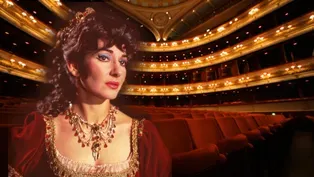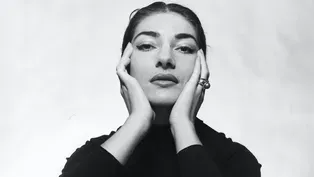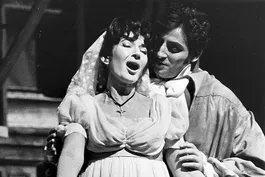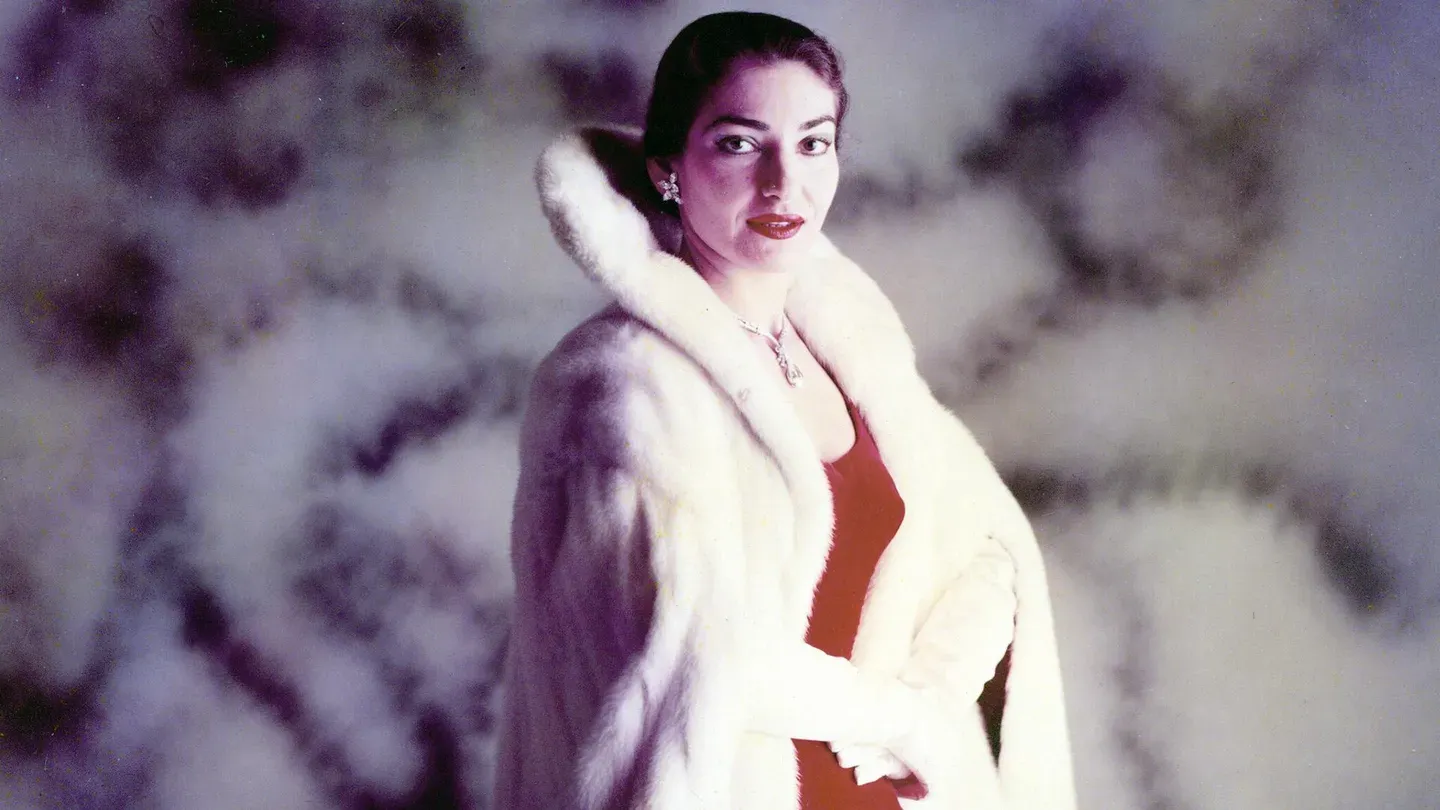

The Magic of Callas
Season 48 Episode 11 | 54m 40sVideo has Closed Captions
Explore the legacy of Maria Callas in this documentary detailing her return to the stage.
Explore the legacy of superstar Maria Callas in this documentary detailing her 1964 comeback at London’s Royal Opera House in “Tosca,” featuring insights from fans including Rufus Wainwright and opera stars Thomas Hampson and Kristine Opolais.
Problems with Closed Captions? Closed Captioning Feedback
Problems with Closed Captions? Closed Captioning Feedback
Major series funding for GREAT PERFORMANCES is provided by The Joseph & Robert Cornell Memorial Foundation, the Anna-Maria and Stephen Kellen Arts Fund, the LuEsther T. Mertz Charitable Trust, Sue...

The Magic of Callas
Season 48 Episode 11 | 54m 40sVideo has Closed Captions
Explore the legacy of superstar Maria Callas in this documentary detailing her 1964 comeback at London’s Royal Opera House in “Tosca,” featuring insights from fans including Rufus Wainwright and opera stars Thomas Hampson and Kristine Opolais.
Problems with Closed Captions? Closed Captioning Feedback
How to Watch Great Performances
Great Performances is available to stream on pbs.org and the free PBS App, available on iPhone, Apple TV, Android TV, Android smartphones, Amazon Fire TV, Amazon Fire Tablet, Roku, Samsung Smart TV, and Vizio.
Buy Now
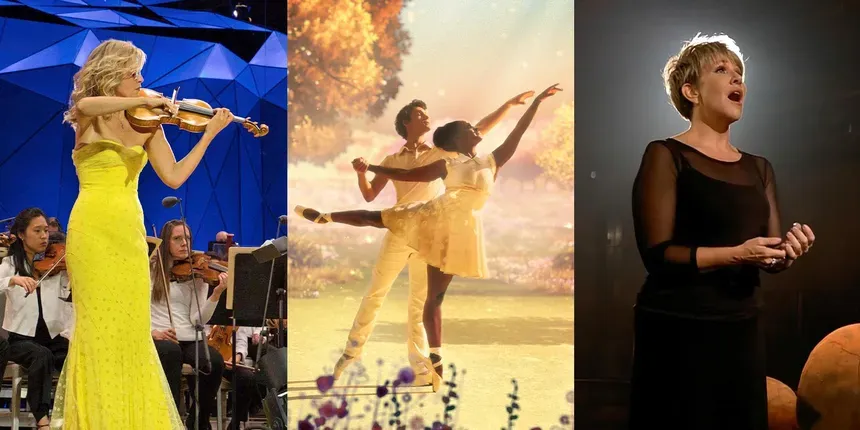
Great Performances Newsletter
Subscribe to the Great Performances newsletter to keep up with the latest full episodes to stream, exclusive content, and more!Providing Support for PBS.org
Learn Moreabout PBS online sponsorship♪♪ -Next on "Great Performances"... relive legendary soprano Maria Callas' comeback performance of "Tosca" at the Royal Opera House in 1964.
-[ Singing in Italian ] -For a look back at the highs... -[ Singing in Italian ] -Its almost as if you hear the soul of Maria Callas singing.
-And lows... -[ Speaking German ] -...of an extraordinary career.
-Every great singer has to sacrifice a lot for their art.
-Join us for "The Magic of Callas."
-This is the best I saw in my life.
-Hello, I'm Peter Gelb, General Manager of the Metropolitan Opera.
The closest I ever came to meeting Maria Callas was in 1971, when I was a 17-year-old office boy for Sol Hurok, Callas's American impresario, who had arranged a farewell recital tour of the U.S. for her and the great tenor -- and her sometime lover -- Giuseppe di Stefano.
I was sent to deliver a contract for their signature, but when I arrived outside their New York hotel room, inside I heard them screaming at each other, so I left the contract by the door and made a quick exit.
Maria Callas was opera's greatest diva, my illustrious predecessor, Rudolf Bing, fired her from the Met in 1958 when they couldn't agree on what she would sing, a fit of pique that he later regretted.
Although today we regularly capture opera performances on video through the Met's Live in HD programs, there is almost nothing of Callas in her prime, which makes this program so extraordinary.
In 1964, only a year before Callas retired from the opera stage for good, The Royal Opera in London announced six performances of "Tosca" with her and Tito Gobbi, the legendary baritone, in a new production directed by Franco Zeffirelli.
More than 120,000 opera lovers applied for seats.
It's no wonder, since Callas hadn't sung on stage for more than two years, choosing to spend her time instead with Aristotle Onassis, her Greek shipping tycoon lover.
But during a temporary breakup with Onassis, Callas decided to make this historic comeback.
The British broadcaster ITV was given permission to transmit the second act -- but just the second act.
So this is the only visual record of Callas, the greatest singing actress of the 20th century, performing "Tosca," one of her signature roles.
Her performance that night was a triumph, with the audience giving her 27 curtain calls in an ovation that lasted 40 minutes.
Months later, she and Bing reconciled, and Callas sang her final two performances at the Met -- also as Tosca.
The film you are about to see of that London performance, punctuated with comments by conductors and other artists of today, shows why Callas was the only opera singer to ever earn the title of La Divina.
-[ Singing in Italian ] ♪♪ ♪♪ -This voice is coming from a complete picture of a human being, the complete her.
-[ Singing in Italian ] -There is something wounded in the way the sound is produced.
And so it's very touching.
-[ Singing in Italian ] ♪♪ -She herself had become a kind of operatic character.
Her own life had become an opera.
And that's a lot of opera for one person.
[ Chuckles ] -[ Singing in Italian ] ♪♪ -Maria Callas is a big drama.
Beautiful, powerful, incredible unique big drama.
-[ Singing in Italian ] ♪♪ ♪♪ [ Singing stops ] ♪♪ -London -- in January 1964, the most famous singer of the 20th century, Maria Callas, is facing the most important comeback of her career.
Terrible reviews and personal crises have forced the diva to take a break from the opera stage.
For her return, she has chosen the Royal Opera House in Covent Garden.
The performance will be Giacomo Puccini's opera "Tosca."
-When it was first announced that Maria Callas was going to sing "Tosca" at Covent Garden, it was so exciting, everybody was fantastically excited.
I mean, her career had been... well... controversial in different ways and people wondered exactly what state her voice was in.
-You have to remember that people were sleeping outside for days to get tickets for her comeback here.
And that doesn't happen very often in opera these days.
-I just grabbed a sleeping bag and went to the Royal Opera House, and slept in my sleeping bag outside the opera house for five nights before the box office opened to make sure.
And I wasn't first in the queue.
-The famous Italian director, Franco Zeffirelli, has taken on the stage direction at short notice.
Until now, he has always refused to stage "Tosca."
For Maria Callas, he has changed his mind.
The audience in the Royal Opera House is expecting the unexpected.
Maria Callas has not been seen on a stage for almost two years.
She wants to perform "Tosca," but she is also scared that she no longer has what it takes.
-Of course we had the belief that she might cancel when we booked the tickets, and every day until the first night really.
-[ Speaking German ] ♪♪ -Tosca is not Callas' favorite role, which makes the challenge even harder.
Will her voice still be good enough for the demanding part?
Will she get through it?
On January 21, 1964, the curtain is raised for the first performance.
A national broadcaster records the second act.
-She was really a legend.
And I think people sympathized with her personal troubles very much, and they wanted her to conquer her demons and... she wins, she can still do this, she is still the greatest.
♪♪ -Tosca is invited to the salon of the Count Scarpia, the chief of police.
He wants information from her -- where has her lover, the artist Mario Cavaradossi, hidden a political refugee?
♪♪ ♪♪ ♪♪ -The atmosphere in the auditorium was just electric.
And she hadn't sung a note yet, she would just walk on.
♪♪ ♪♪ [ Both singing in Italian ] ♪♪ ♪♪ ♪♪ -At that time it was a problematic, her high register.
She still was brilliant.
[ Both singing in Italian ] ♪♪ ♪♪ -[ Speaking German ] [ Both singing in Italian ] ♪♪ ♪♪ ♪♪ ♪♪ ♪♪ ♪♪ ♪♪ -[ Speaking German ] [ All singing in Italian ] ♪♪ -It's touching to watch this because you also see how... at this time she's really... She is not at the height of her powers anymore, but she still has it, you know?
-What we hear is not an impeccable technique.
What we hear is this extraordinary expression of the human voice, is this emotions pouring out of this fantastic artist.
♪♪ [ Both singing in Italian ] ♪♪ -I believe very much in singers singing through their eyes.
And if you look at Maria Callas and Tito Gobbi together, the eyes are saying as much as the voice and physical movements.
♪♪ [ Both singing in Italian ] ♪♪ -These titans of good and evil and victim and power and sex and blasphemy.
All these things put together which collide.
Puccini... so sadistically, perfectly lays this out in their dialogue.
[ All singing in Italian ] ♪♪ ♪♪ ♪♪ -There's also a level of attractiveness.
There's a certain magnetism between these two animals that you cannot deny.
[ All singing in Italian ] ♪♪ -[ Laughing ] ♪♪ ♪♪ ♪♪ -[ Speaking German ] -[ Speaking German ] -Tosca's second act demands everything from the principal performer.
Maria Callas seems the perfect artist for the role.
That has not always been the case.
She had to fight hard for it.
Although her voice met all the technical requirements at the start of her career, her body did not.
She opted for a radical regime -- eating only salad and raw meat, allegedly swallowing a tape worm, consulting cosmetic surgeons and gets advice from doctors about medicinal diets... with problematic consequences.
-[ Speaking German ] -I don't know the conditions under which she lost all this weight.
I don't know if it was because of depressions, she wanted to lose weight, she thought she got too heavy.
You can add all these things up.
All of these things you add up in that equation as a human being are going to have a direct effect on your vocalism as a person.
-It's been my experience in observing singers who have gone through extreme weight loss, that the voice is affected.
That the level of support around the diaphragm area is somewhat compromised.
♪♪ -First it was her weight that drew criticism, then it was her voice.
Only once the heavyset prima donna had metamorphosed into a delicate starlet did artistic opportunities begin to open up and Callas could convincingly portray certain figures on stage.
-The second act is the favorite moment.
It's one of the greatest scenes to be privileged to sing and play in all of opera repertoire.
It's just an astounding, musical construction that is beyond it.
-Zeffirelli had had the idea of the torture chamber being below ground.
When Gobbi stamped his foot and the thing opened.
I mean, the excitement just in terms of theatre, that moment, I can still remember.
[ All singing in Italian ] ♪♪ ♪♪ -[ Speaking German ] [ All singing in Italian ] ♪♪ -[ Speaking German ] [ All singing in Italian ] ♪♪ ♪♪ -[ Speaking German ] -Opera art... this is not only singing.
Opera art is a theatre.
Opera theatre.
If you just make a beautiful voice or you try to make a beautiful voice and you are taking care of line...it's not enough.
I know it by myself.
-You have to be interpretively interesting.
At the same time you have to be faithful to what the composer desires of you.
And yet it's show business.
You have to be able to seize the moment.
♪♪ [ All singing in Italian ] ♪♪ ♪♪ ♪♪ ♪♪ -Why is it so incredibly special?
Because it's full of truth.
Because these are just two people giving it all on stage, creating characters there are completely alive.
These are not instruments performing at their best.
These are human beings, souls, and there is the animal and the artist, the angel and the demon coming together, fusioned in an amazing wave of emotion.
-[ Screams ] [ All speaking Italian ] -[ Speaking German ] [ All singing in Italian ] ♪♪ ♪♪ -[ Speaking German ] ♪♪ ♪♪ ♪♪ [ Both singing in Italian ] ♪♪ ♪♪ ♪♪ ♪♪ -I suppose rehearsing with Maria Callas, the process with Maria Callas, I imagine it would have been very difficult.
I think she was a very difficult person, she was a big diva, she was complicated.
But this enormous artist, wow, of course I would have loved to share the stage with her, to sing with her, to have her in my arms.
To join my voice with her voice, it would have been amazing.
I think all those great singers who sang with her were very fortunate to do so.
[ All singing in Italian ] -[ Laughs ] ♪♪ ♪♪ ♪♪ ♪♪ ♪♪ -She expected professionalism from everybody around her.
the most disciplined group of people.
You know, it was very easy for them to go on and sing on the stage with no rehearsal whatsoever.
But she found rehearsal, especially when she was working with the right people, to be very, very important for the final product.
[ All singing in Italian ] ♪♪ ♪♪ ♪♪ ♪♪ ♪♪ ♪♪ -She has obviously made a decision to give herself to Scarpia, and to save her beloved it Mario.
It's dare, she confronts Scarpia and she dares him to announce what his price will be, knowing what it will be -- it's a strange -- and... so the level of... courage and...
I can say it in German -- "Mut" she has is absolutely incredible.
♪♪ [ Both singing in Italian ] ♪♪ ♪♪ ♪♪ ♪♪ ♪♪ ♪♪ ♪♪ ♪♪ -There's a moment in Act II when Tosca says "quanto," she says, "How much?"
And Scarpia repeats "quanto?"
And she says "il prezzo."
Now those notes in the score, in the music, in the "partitura," are written as notes.
And nobody, or very few people actually sing those notes, because they're almost too melodramatic.
They have to be spoken.
[ Both speaking Italian ] -[ Laughs ] -[ Speaking German ] [ Both speaking Italian ] -[ Laughs ] [ Singing in Italian ] ♪♪ ♪♪ ♪♪ ♪♪ -Callas' closest friends, confidantes and cherished artists, and in this film is Tito Gobbi.
For a baritone, if you a baritone singing opera and you do not know Tito Gobbi's work you will never be the baritone that you can be.
This is also an iconic figure of startling ability.
And both of them had, even though Callas' voice was perhaps... a soprano is always a soprano... but what they had in common was when you listened to them, you listened to the people they were singing.
-[ Singing in Italian ] ♪♪ ♪♪ ♪♪ ♪♪ ♪♪ -[ Speaking German ] ♪♪ -[ Singing in Italian ] ♪♪ ♪♪ ♪♪ ♪♪ ♪♪ [ Both singing in Italian ] ♪♪ ♪♪ ♪♪ ♪♪ -Scarpia is a very smart man.
This is no pimp.
This is a deeply dangerous political animal of unbridled maliciousness and manipulation.
And he manipulates and plays Tosca like a bad violin.
♪♪ -[ Singing in Italian ] ♪♪ -[ Speaking German ] [ Both singing in Italian ] ♪♪ ♪♪ ♪♪ ♪♪ ♪♪ ♪♪ ♪♪ -You simply cannot be a great, deep artist if you've had a nice life.
You need experience.
Without experience, you cannot learn.
-I think Maria Callas suffered a lot.
I think every great singer has to sacrifice a lot for their art.
Physically, emotionally.
Certainly in her private life she sacrificed a lot.
And when she decided that her private life had to take center stage in her life, her singing suffered for this.
♪♪ -Maria Callas' private life enters into the public domain more and more.
She becomes a glamour icon, and is at home with the jet set.
Her affair with the Greek shipping magnate and multi-millionaire Aristotle Onassis dominates the headlines.
♪♪ -[ Speaking German ] ♪♪ -Maria Callas and Aristotle Onassis make appearances as the dazzling couple at high society balls.
Callas hopes to marry Onassis.
She falls pregnant.
But Onassis has his sights set on a new prize -- Jackie Kennedy, the widow of the murdered President John F. Kennedy.
-At the time we had rented a house in Martha's Vineyard in Massachusetts on the island of Martha's Vineyard, and that's where Jacqueline Onassis summers.
And we knew she was on the island, so we would drive around her estate, blasting "Casta Diva" from the car at full volume to try to wake her up in the middle of the night.
So that was my first Callas.
I was kind of like a hooligan.
[ Laughs ] A Callas hooligan.
♪♪ ♪♪ -[ Speaking German ] [ Both singing in Italian ] ♪♪ ♪♪ ♪♪ ♪♪ ♪♪ ♪♪ ♪♪ -You could tell by listening to her very late on that those scars certainly are audible in the sound of her voice.
♪♪ -[ Singing in Italian ] ♪♪ ♪♪ ♪♪ ♪♪ -Maria Callas is very much a tragic person.
The fact that she's Greek, of course, lends itself to all kinds of... well, you know, Greek tragedy.
But in a way she did live a Greek tragedy, and enormous success in her public life and enormous failure in her personal life.
And she thought, she's even quoted as saying that love is much more important than any artistic triumph.
-[ Singing in Italian ] ♪♪ ♪♪ ♪♪ ♪♪ ♪♪ ♪♪ ♪♪ ♪♪ ♪♪ ♪♪ -I was in CC2, the seats that are down at the side.
But of course, if you got 1 to 4, you had a perfect view of the stage.
The acoustic higher up was perfect.
-She probably knew in every theatre she played, where her voice would sound the best, how to hit the back of the hall, how to get what she needed from the room, architecturally.
And they had that at the Royal Opera House where she would place herself.
And really you could tell the difference.
-She was extremely technical.
You know, when people say, "Well, this..." She worked extremely hard with her technique, she knew how to use her voice, to create the right muscular tension to liberate the voice, and make the tone come as freely as possible.
There are a lot of things from her, an extraordinary technician.
♪♪ -[ Singing in Italian ] ♪♪ ♪♪ ♪♪ ♪♪ -When we see artists like Maria Callas, Tito Gobbi on stage -- And remember, this performance of Act II, just Act II alone, was something quite special.
We look at these two artists and we say, well, it's obvious, it can only be that way and they're doing everything that is clearly demanded from the situation.
-And this is what was so genius in my opinion about Callas, is that she could make that seem as if it was natural, or if it was self understood.
[ All singing in Italian ] ♪♪ ♪♪ ♪♪ ♪♪ [ Knocking ] ♪♪ ♪♪ ♪♪ -The filming of "Tosca," of Act II -- Maria Callas, Tito Gobbi -- is legendary for many reasons.
The fact that it's in black and white gives it a certain gothic quality, which fits the kind of lurid nature of the story and the tendency to violence, if you like.
On the one hand it's prehistoric and on the other hand something that's so timeless and a gift to us to look at and to remember why we do this job, why singers sing, why conductors conduct, why opera is about the words, the eyes, the theatre, and not just about the beautiful sounds that come out.
♪♪ [ Both singing in Italian ] ♪♪ ♪♪ ♪♪ ♪♪ -[ Speaking German ] ♪♪ [ All singing in Italian ] ♪♪ ♪♪ ♪♪ ♪♪ -To estimate what it takes to be someone who has to stand onstage and then on top of it to sing...
It's huge and it's a lifelong struggle and battle to get it right.
♪♪ ♪♪ -Scandal is a part of her diva myth.
With her cancellations, her physical transformation and her affair with Onassis, Callas repeatedly provokes the opera industry.
The press gratefully lap it up but tear her to pieces in return.
♪♪ -[ Speaking German ] -Maria Callas was the most criticized singer.
She was living in pain to have such a really bad reviews, one after the other.
A lot of people who really hated her.
It was hate against her.
-[ Speaking German ] ♪♪ ♪♪ ♪♪ [ Speaking German ] ♪♪ [ Both singing in Italian ] ♪♪ -This is my favorite music, yeah, in the opera.
♪♪ -[ Speaking German ] ♪♪ ♪♪ -[ Speaking German ] ♪♪ ♪♪ -Tosca is a very strong woman.
Very female, but very strong.
♪♪ [ Both singing in Italian ] ♪♪ ♪♪ ♪♪ ♪♪ -[ Speaking German ] [ Both singing in Italian ] ♪♪ ♪♪ ♪♪ -What force, what power, what charm, what musicality.
-[ Singing in Italian ] -And in a weird way, it's kind of like a sacrifice.
She was kind of a sacrifice in a lot of ways.
-[ Singing in Italian ] ♪♪ -It's so unique, and it comes from a very honest place.
It's almost as if you hear the soul of Maria Callas singing.
♪♪ -Maria Callas was a real stage animal.
This is the best I saw in my life.
The best.
And I still think so.
♪♪ ♪♪ -She, of all gifted artists, is the patron saint of responsibility to your talent, galvanizing of your art, never giving up.
♪♪ -[ Speaking German ] -[ Speaking Italian ] -We'll always remember the performance.
Of course I will.
I'm just really lucky to have been there, blessed in a way.
[ Cheers and applause ] -Maria Callas, 1964.
As Tosca, she celebrates her comeback in the Royal Opera House in Covent Garden.
She proves that she is the prima donna assoluta, the undisputed prima donna.
The performance is a roaring success -- a magic moment of music.
[ Cheers and applause continue ] -[ Singing in Italian ] ♪♪ -To find out more about this and other "Great Performances" programs, visit pbs.org/greatperformances, find us on Facebook and follow us on Twitter.
-[ Singing in Italian ] ♪♪
Video has Closed Captions
Clip: S48 Ep11 | 1m 38s | Antonio Pappano discusses the power and impact of Act II of Puccini's "Tosca." (1m 38s)
Video has Closed Captions
Preview: S48 Ep11 | 30s | Explore the legacy of Maria Callas in this documentary detailing her return to the stage. (30s)
Video has Closed Captions
Clip: S48 Ep11 | 2m 11s | Watch Maria Callas' stellar performance of the heartwrenching aria "Vissi d'Arte." (2m 11s)
Providing Support for PBS.org
Learn Moreabout PBS online sponsorshipSupport for PBS provided by:
Major series funding for GREAT PERFORMANCES is provided by The Joseph & Robert Cornell Memorial Foundation, the Anna-Maria and Stephen Kellen Arts Fund, the LuEsther T. Mertz Charitable Trust, Sue...
